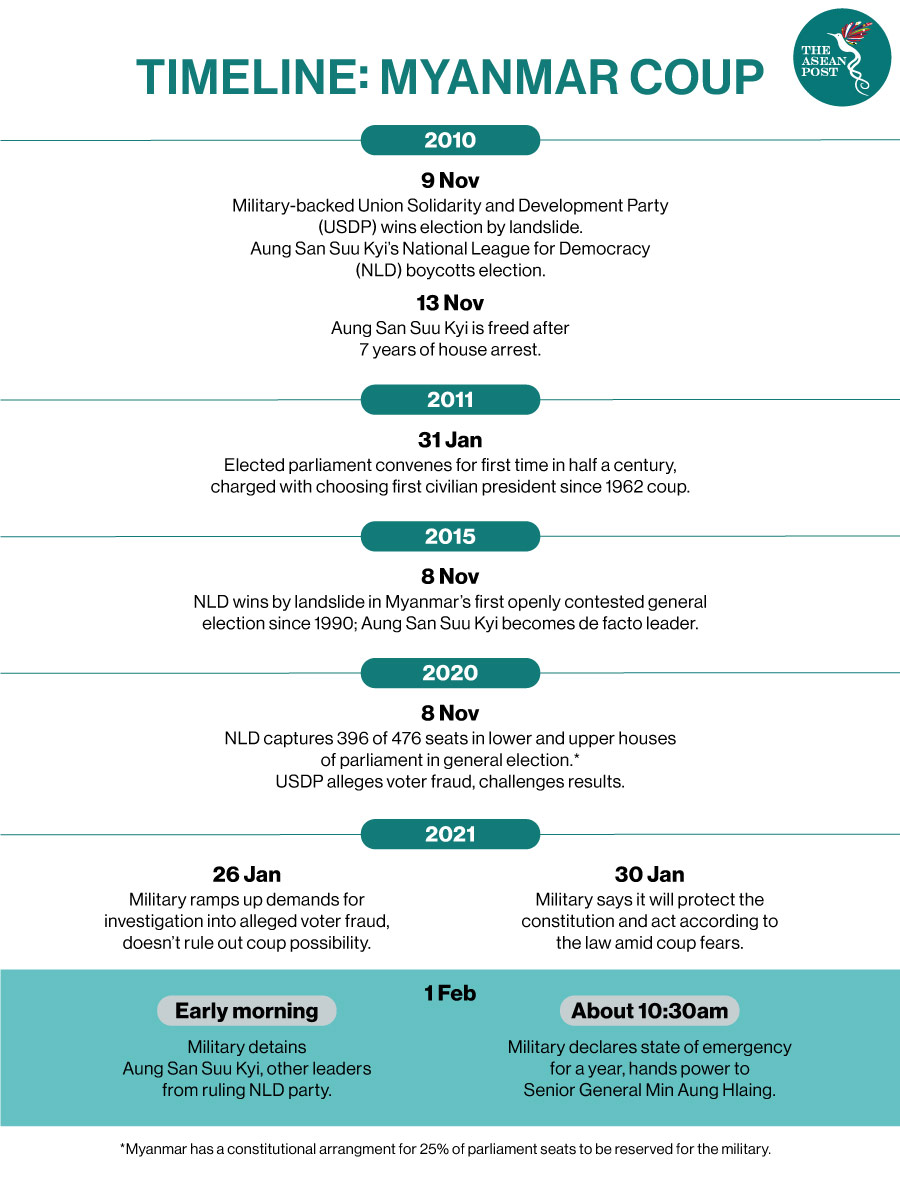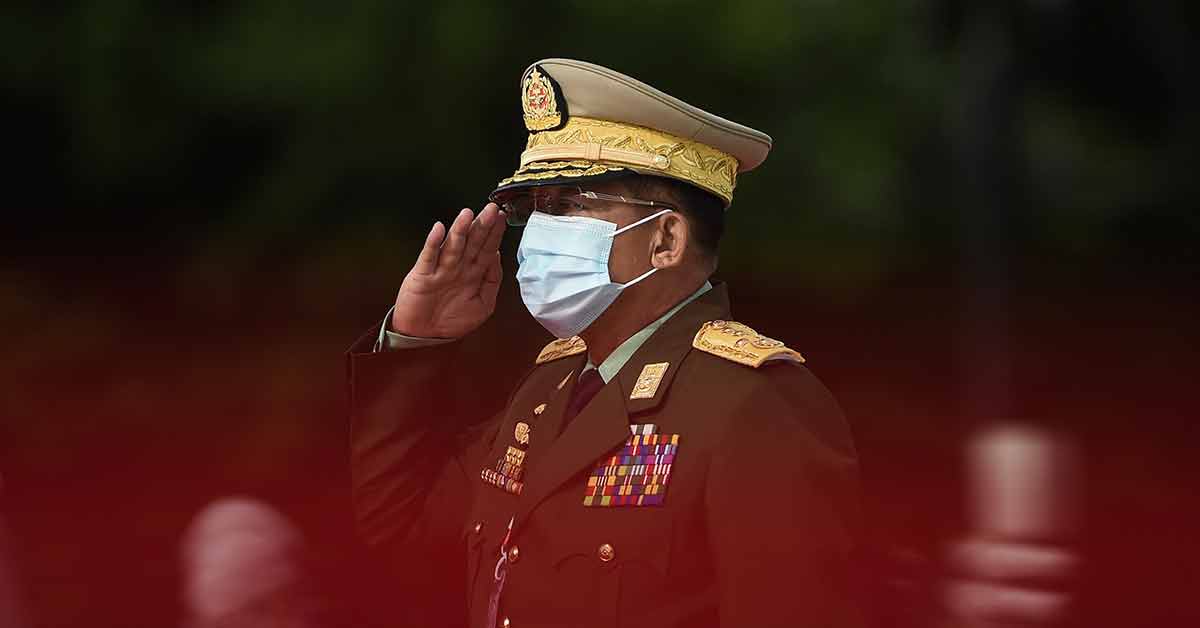Since the British declared independence of Burma in 1948, the Tatmadaw – Burmese Army – has been running modern-day Burma via coups and proxies. Up until 2008, Myanmar, as it is now known, had no Constitution, and only from 2011 to 2015 did it go through a proper democratic transition with a general election finally being held in 2015.
The election saw the National League for Democracy (NLD) helmed by de-facto Leader, Nobel Laurette, and Myanmar’s symbol of Democracy, Aung San Suu Kyi, sliding to victory. The more recent November 2020 general election saw the General’s Daughter, as she is fondly known, and her NLD party obtain a landslide victory; winning a colossal 83 percent of the 476 seats in the Burmese Parliament.
The Tatmadaw, led by the notorious Min Aung Hlaing (Dawei), who is set to retire in July 2021, disputed the results citing electoral fraud, and proceeded to consolidate power via a military coup.
General Min Aung Hlaing (Dawei)
A protégé of now-retired controversial military junta leader Than Shwe, General Dawei rose up the ranks quietly and in the shadows of the "Aba Gyi" or "Great Father" – the term used to refer to Than Shwe.
The Great Father was a violent dictator whom the United Nations (UN) had a tough time dealing with – refusing humanitarian aid during Cyclone Nargis, refusing to allow the UN Secretary General to visit Suu Kyi during her house arrest, and ordering the execution of 59 civilians living on Christie Island. The list is long and General Dawei is cut from the same cloth.
Hence the coup d’état has come as no surprise to the international community despite the Electoral Commission validating the results.
Instead of planning for retirement, General Dawei has proceeded to hijack democracy and propose a year-long emergency rule. Banned from Twitter, Facebook, and from travelling to the United States (US), General Dawei is a firm believer that the actions of the junta against the minority Muslim Rohingya is justified. Referring to them as “Bengali” and foreigners, he has been at the forefront of the ethnic cleansing and displacement of these “foreigners” on “Burmese soil.”
He continues to carry the baton of the “Great Father” junta military rule ideology, having negotiated the release of Suu Kyi in pre-junta military rule Myanmar and also silently forcing his hand on her during her time in office.
At the Hague, under the spotlight and to the amazement of the very same international bodies that pushed for her release from house arrest, Suu Kyi defended allegations that the Tatmadaw were not hell-bent on “destroying the Rohingya as a group, in whole or in part”; despite close to 700,000 having fled Myanmar to Bangladesh; causing an international humanitarian crisis for both countries that share a common border.
Blaming a possible civil war scenario between the Tatmadaw and the Arakan Rohingya Salvation Army, Suu Kyi told judges at the Hague to “please bear in mind this complex situation and the challenge to sovereignty and security in our country when you are assessing the intent of those who attempted to deal with the rebellion.”
“Surely, under the circumstances, genocidal intent cannot be the only hypothesis,” she added.
What transpired in the corridors of power between General Dawei and Suu Kyi remains unknown.
The Dawn Raid
“When these tasks have been completed in accord with the provisions of the State of Emergency, a free and fair multiparty general election will be held and then, the assigned duty of the State will be handed over to the winning party, meeting norms and standards of democracy” – read a statement issued by General Dawei’s office to the international community and people of Myanmar, citing the need to rectify electoral fraud and contain the COVID-19 outbreak.
At the time of writing, Myanmar has close to 12,000 active cases and over 3,000 fatalities related to the COVID-19 coronavirus.
Known for his shrewd, lethal, and stealthy manoeuvring, the pre-dawn raid within hours of the swearing-in was a classic example of the tactics employed by General Dawei and the Tatmadaw.
In one fell swoop, on the back of playing tensions with the civilian government – Win Myint the President, Suu Kyi, and dozens of other members of the NLD were detained under the emergency ordinance.
Before the raid, communications were cut off in the capital at 5:00 am. Phone and internet connections in the administrative capital of Naypyitaw and in the main commercial city of Yangon were disrupted and state television went off air.
Post raid, false statements were doctored by the Tatmadaw under the name of the NLD Godfather and patron U Win Htein and circulated amongst civilians calling them to take to the streets and protest the emergency. The objective was to create a confrontational situation that is Pro-NLD and Pro-Tatmadaw but the NLD has consistently opposed this, calling voters to be non-violent and non-confrontational.
Cold war tactics such as these are part of General Dawei’s playbook. What guarantee do the people of Myanmar have that in a year’s time democracy will return?

The Tatmadaw’s Billions
In 2015, transparency campaigners Global Witness released a report stating that the Tatmadaw may have allegedly carried out the “biggest natural resources heist in modern history.” The report claimed that a massive US$31 billion in jade production had been extracted from mines located in Kachin state – dubbed the world's biggest jade mine.
In simpler terms, the aforementioned amount represented nearly 50 percent of Myanmar’s official gross domestic product (GDP) and about 50 times the government’s expenditure on healthcare.
The vast majority of this extracted jade is smuggled by the Tatmadaw and sent across porous borders into China. The Tatmadaw operates like a cartel and has a hand in all lucrative contracts including the alleged drug trade.
Top cronies and known drug lords are believed to be closely linked to the junta military and nothing moves without a cut from the largesse. Even ethnic armies, in return for maintaining a ceasefire in certain states within larger Myanmar, are given concessions for all forms of natural resource allocation.
And on top of this pyramid of rampant corruption and abuse of power is General Dawei.
Suu Kyi And The Last Decade
While Suu Kyi’s arrival as a beacon of democracy brought about a freer press – people having access to mobile phones and the internet, commercial development and better access to water and electricity as well as the release of a number of political prisoners – she has failed to make a move towards containing and reducing the influence of the all-powerful Tatmadaw and their tentacles within the nation’s apparatus.
In hindsight, her biggest mistake is probably allowing the sleeping dragon to awake, for allowing the traitors and underminers of democracy to plot, scheme and manifest into a reformed Tatmadaw; that is shrewder, more daring, and blatant in its pursuit for absolute power.
As result, Myanmar has been dealt a huge blow. The ASEAN member state has taken a step back and is now a junta military-controlled state. The opportunity of a lifetime where political power sat with the people of Myanmar has now been diminished and probably gone for good.
Has the General’s Daughter been naïve to think she could have managed Myanmar’s Mafia General?
Related Articles:
